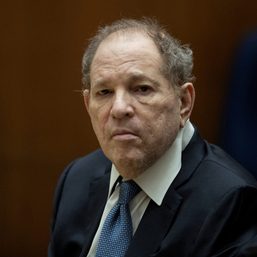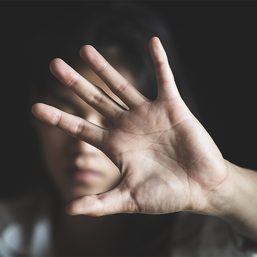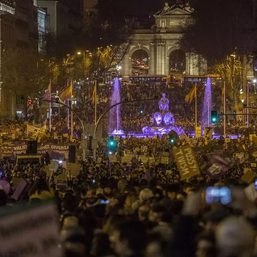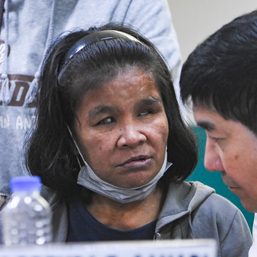SUMMARY
This is AI generated summarization, which may have errors. For context, always refer to the full article.
![[OPINION] What solidarity means to the women around you](https://www.rappler.com/tachyon/2022/11/solidarity-women-november-24-2022.jpg)
Trigger warning: sexual assault, trauma, suicide, depression, PTSD
When I was 12, I was sexually assaulted and harassed by men who were close to me. Today, as I am nearing 30, I am still suffering from the effects of those encounters. It is difficult to sum up what that “suffering” looks like – it is a delicate mix of always feeling numb while also always feeling pain. More than once, I have thought about ending my life because I feel compelled to do so either by the constant feeling of numbness or the overpowering sense of pain.
Sometimes I would try to recall blurry images from drunken nights with older predators beside me, and all I could recall was the feeling of being numb and the smell of cigarettes on their mouths. I think it quite strange that I currently suffer from past encounters when, at that time, I had no idea what had happened, how to feel, who to tell, and, more importantly, who to blame.
I also did not know if what had occurred was wrong. I allowed one of my assaulters, who was seven years older than I, to walk me home after his crime. He whispered an apology into my ear and kissed my cheek, which made me shudder. I didn’t know what to do because I couldn’t tell whether what was happening was wrong or right. I did know one thing, though – I could not tell anyone what had happened because, though I did not know who I could blame at that time, I knew who everyone else would blame if they knew.
At that time, I did not fully understand the consequences of victim-blaming. All that mattered to me was that if my family knew what had happened, I would suffer the consequences. I would be the one locked up at home, unable to leave the house unaccompanied. I would be the one seen as “dirty” because I had been touched by men before I could even call myself a teenager.
I have been told that I suffer from trauma. Whether it is from those isolated experiences is unclear to me, but when I replay those unfortunate months after the events over and over again, I keep wondering if there is more to it than that. I believe that what really traumatized me was all those years of suppressing what had happened in fear of losing my freedom. As a result, I turned into the proverbial angsty teenager that everyone called “troubled” when, in fact, all I felt was silenced and alone.
What could solidarity have meant to me at that time?
Words are powerful. It is a truth so pervasive it runs the risk of being overlooked. Every now and then I shy away from correcting people when they blame victims of rape and sexual harassment because I just know, in my heart, that most of them will roll their eyes and say, “There she goes again.” They do not understand the power of their words. They do not see the traumatized girl who blocks her feelings and experiences to the remotest corners of her mind because, even though in her heart, she knows she did nothing wrong, there is a truth ingrained in her mind that is constantly being reinforced by the words of her family, teachers, and peers.
What could solidarity have meant to me at that time?
At 12 years old, I wished I had heard at least one person say that rapists and sexual assaulters were at fault. I wished I never heard anyone slander the good name of innocent children, women, and people who did nothing wrong. I wished that when I was acting out throughout my teenage years because I felt so isolated and misunderstood, someone could have sat me down and asked me what was wrong instead of talking about how troubled I was behind my back. I wished I weren’t taught by my Catholic community and my Catholic school that girls who wear shorts are “asking for it.” I wished my family and friends were more open to talking about sexuality, especially women’s sexuality, rather than pretend that it did not exist.
More importantly, I wished I lived in a world where, if I were sexually assaulted or raped, I would not be afraid to tell my parents what had happened, and they would know what to do. They would know about the anti-rape law and, if the Safe Spaces Act had been already ratified at that time (it wasn’t), they would know about that, too. They would know that I might need counseling, but they would not blame me.
I wished I lived in a world where I would never have to worry about my freedom if I spoke up about being sexually assaulted because our justice system would be strong. I wished I lived in a world where there was a strong sense of solidarity with women, girls, and all people of different sexual orientations and gender identities.
Perhaps, then, I wouldn’t be shaking right now, trying to suppress my tears as I try to find the right words to convey how important it is for all of us to acknowledge the sexuality of young girls, women, and all people of diverse SOGIEs. Perhaps, then, we would know how to protect each other. Then maybe, just maybe, I, and countless other women, girls, and people would not have to live with PTSD because, believe me, quite a few of us really don’t.
What does solidarity mean to me now?
Today, solidarity means I can speak up about sexual harassment, rape, gender equality, and women’s rights without being branded as that person – the feminist who always seems to be angry at everything and who always needs everyone to be politically correct. I am not always angry, and there is nothing wrong with asking you to be a decent human being. Sadly, that world does not exist for me yet, but this is what solidarity can mean to the women and girls around you, especially to your children and siblings. We never know what unpleasant experiences they may be suppressing, and we may never know unless we show our solidarity with all women and open spaces where we can be heard without judgment or violence.
Today, solidarity means I will continue fighting and speaking up for all the women, girls, and people who deserve better. I can’t force the people around me to take part in the struggle; all I can do is show them how important it is. – Rappler.com
Ellaine Díaz is a women’s rights advocate, singer, and songwriter who is currently taking her MA in Women and Development at the University of the Philippines, Diliman. Her focus is on women’s economic empowerment, tax and gender justice, and international development.
Add a comment
How does this make you feel?
![[OPINION] Women are more than victims needing personal protection](https://www.rappler.com/tachyon/2021/01/Women-victims.jpg?fit=449%2C449)







![[Free to Disagree] Arrest Quiboloy!](https://www.rappler.com/tachyon/2024/03/Free-to-disagree-arrest-quiboloy-March-11-2024-1.jpg?resize=257%2C257&crop_strategy=attention)

There are no comments yet. Add your comment to start the conversation.